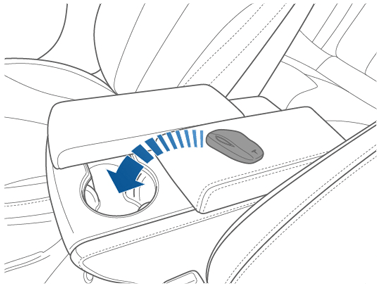Starting and Powering Off
Starting
- Press the brake pedal - Model S powers on and is ready to drive.
- Select a drive mode - move the drive stalk down for Drive or up for Reverse (see Shifting).
Everything you need to know when driving Model S displays on the instrument panel.
Key Fob Not Inside
If Model S does not detect a key fob when you press the brake, the instrument panel displays a message telling you that a key fob is not inside.
If you receive this message, press the brake and place the key fob in the center console cup holder where Model S can best detect it.

If Model S still does not detect the key fob, try holding it against the center console, immediately below the low voltage power socket (see Low Voltage Power Socket). Or try using another key fob. If another key fob does not work, contact Tesla.
A number of factors can affect whether Model S can detect the key fob. These include a low battery in the key fob, interference from other devices using radio signals, and objects between the key fob and receiver.
Always keep the key fob with you. After driving, the key fob is needed to restart Model S after it powers off. And when you leave Model S, you must bring the key fob with you to lock Model S, either manually or automatically.
Powering Off
When you finish driving, shift into Park by pressing the button on the end of the drive stalk. When you leave Model S with the key fob, it powers off automatically, turning off the instrument panel and touchscreen.
Model S also powers off automatically after being in Park for 30 minutes, even if you are sitting in the driver’s seat.
Although usually not needed, you can power off Model S while sitting in the driver’s seat, provided the vehicle is not moving. Touch . Model S automatically powers back on again if you press the brake pedal or touch the touchscreen.
Power Cycling the Vehicle
- Shift into Park.
- On the touchscreen, touch .
- Wait for at least two minutes without interacting with the vehicle. Do not open the doors, touch the brake pedal, touch the touchscreen, etc.
- After two minutes, press the brake pedal or open the door to wake the vehicle.